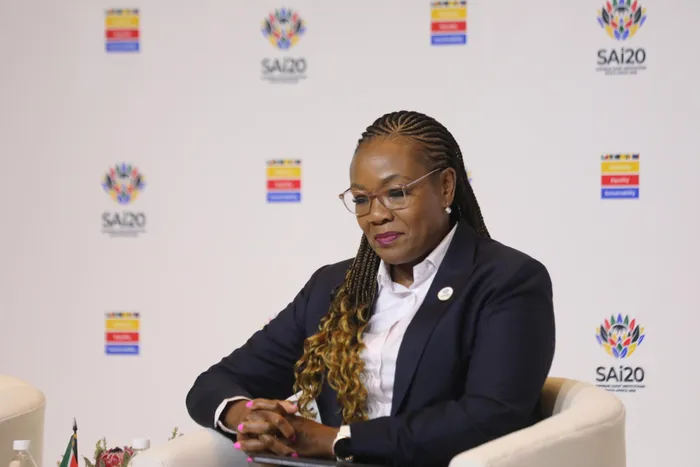
Auditor-General Tsakani Maluleke at the Supreme Audit Institutions (SAi) 20 Summit at Melrose Arch, Johannesburg.
Image: Timothy Bernard / Independent Newspapers
Auditor-General Tsakani Maluleke believes supreme audit institutions (SAIs) like her office are uniquely positioned to provide foresight, insight, and enable oversight in the use of governments’ limited resources for socio-economic development.
Maluleke, speaking on the opening day of the SAi20 Summit at Melrose Arch, Johannesburg, on Tuesday, said the gathering was not a mere appendix to the chapters of the G20 programme; rather, it is a critical and interrelated component of the very substance of the intergovernmental forum’s deliberations and resolutions.
“Therefore, to the extent that the G20 is seized with how to confront and overcome the challenges facing humanity today and thus answering the question of what is required to make a difference to the lives of their citizens; therein is the perspective, expertise and voice of SAIs and how we are uniquely positioned to provide foresight, insight and enable oversight,” she stated.
According to Maluleke, SAIs were critical towards how the governments’ finite resources might be optimally harnessed and allocated towards realising the socio-economic development outcomes that their resolutions in the G20 are a reflection of.
She added that the International Organisation of Supreme Audit Institutions affirmed, as endorsed through United Nations resolutions, the value and benefit of SAIs to make a difference to the lives of citizens.
Maluleke said SAi20 has managed to highlight how the unique mandate, capabilities, and vantage point of SAIs position the institutions to support their nations in addressing the key stumbling blocks to progress.
She also believes that while SAi20’s themes of infrastructure and skills development, along with the challenges relating to them, have featured consistently and prominently on the G20 agenda since its inception in 1999 and progress has been made, backlogs and deficits not only persist but continue to grow.
“The challenge has not been the why and what of what needs to happen, but rather the how; it has not been a lack of knowledge and resources that has held the world back, but rather the challenges of how to do what we need to do,” Maluleke said.
She said SAIs have focused on the particular factors that have driven the unrelenting persistence of these challenges.
“We have tapped into our unique expertise and capabilities – particularly relating to having the whole of government’s view of resource allocation, flows and utilisation, and risk management – to surface recommendations that governments and SAIs can apply towards unlocking the much-needed accelerated progress towards the realisation of the goals concerning those areas,” explained Maluleke.
Such a role and function could only have been played by SAIs with the effectiveness and the rigour that these institutions have, according to the A-G.
Maluleke said the African continent is teetering precariously on the tightrope between harnessing opportunity and being overcome by calamity, being blessed with the fastest-growing, youngest population, endowed with 30% of the world’s mineral deposits, and over 65% of the world’s uncultivated arable land.
Conversely, natural and manmade disasters such as the recent unprecedented floods that left over 100 people dead in the Eastern Cape, record levels of hunger caused by conflict, economic hardship, and repeated extreme weather and climate disaster-induced displacement of millions from their homes are also the continent’s reality.
“Of greater concern is that these are not new problems; they are not new headlines. For decades, these reports of disaster have overshadowed the abundance of resources and opportunities that our continent has been blessed with,” Maluleke said.
She added that, however, these are not problems of politics but problems of humanity.
“They are not resource problems either, but rather a struggle with the allocation and efficient, effective use of those resources towards the betterment of the people of this great continent.
“More significantly, they are not just African problems; they are a microcosm of the challenges confronting or, in one way or another, affecting all the countries of the world – those represented here and beyond,” explained Maluleke.
loyiso.sidimba@inl.co.za